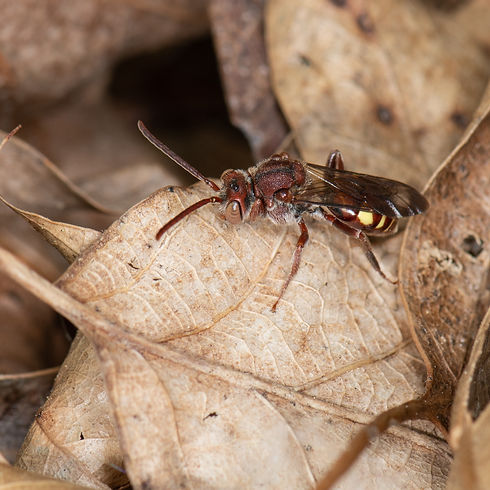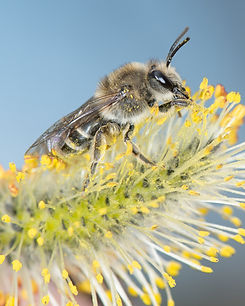Nomada
Nomadic Cuckoo Bees
In Minnesota, there are thirty-seven described species within the genus Nomada. Nomada are cleptoparasites (cuckoo bees) of ground-nesting bees. Most species in Minnesota parasitize Andrena nests; three species are known to parasitize Agapostemon nests. The phenology of cleptoparasitic bees must overlap with their host(s). In Minnesota, the majority of Andrena species are active in spring, a handful in summer, and a minority in fall. This pheonogical pattern is nearly identical for Nomada. These cleptoparasitic bees are medium size and range in length from 4 to 16 mm (0.15 to 0.6 inches). Nomada are wasp-like, relatively hairless, and females lack pollen-collecting structures. The spring- and early summer-active species typically have a maroon integument with white or yellow markings; the late summer/fall-active species typically have a black integument with white or yellow markings.
Like other cleptoparasites of ground-nesting bees, Nomada females monitor the host's nest by perching on leaf litter, vegetation, or an object on the ground such as a log. When the host leaves the nest, the Nomada female enters the nest and lays an egg in a partially or fully provisioned brood cell.

Nomada female visiting Salix discolor (pussy willow).


wing position
on flowers
37
NO. SPECIES
IN MN
size range

Phenology

Genus Characteristics

Marginal
cell
1
3
2
Three forewing submarginal cells. The 1st cell is the size of the 2nd and 3rd cell combined. Marginal cell with pointed tip.

Maroon or black integument with white or yellow markings on the thorax and abdomen. Sparse white hairs.

Rear face of thorax sloped at 45° angle. Compound eye set back from mandible or mandible and compound eye misaligned.

Long glossa (tongue).

Female lacks pollen-collecting (scopal) hairs, and the last abdominal segment (T6) is broad.

Relatively hairless, wasp-like appearance.


Andrena nest

Behavior
A female perches on leaf litter just above an Andrena nest. She monitors the nest and waits for the host to leave before entering the nest.
Distribution

Nomada aquilarum

Nomada articulata

Nomada australis

Nomada banksi

Nomada bella

Nomada besseyi

Nomada bethunei

Nomada cressonii

Nomada cuneata

Nomada denticulata

Nomada depressa

Nomada erigeronis

Nomada fervida

Nomada fuscicincta

Nomada gracilis

Nomada graenicheri

Nomada illinoensis

Nomada imbricata

Nomada integerrima

Nomada lehighensis

Nomada lepida

Nomada louisianae

Nomada luteoloides

Nomada maculata

Nomada obliterata

Nomada ovata

Nomada perplexa

Nomada pygmaea

Nomada rubi

Nomada rubicunda

Nomada sayi

Nomada superba

Nomada tiftonensis

Nomada vegana

Nomada vicina

Nomada vincta

Nomada xanthura
Portman et al (2023)
Additional Record
Nomada Species in Minnesota
Scientific Name | Host |
|---|---|
Nomada aquilarum | Andrena (Cnemidandrena)? (Gibbs 2023) |
Nomada articulata | Agapostemon sericeus, Agapostemon virescens (Abrams and Eickwort 1980, 1981) |
Nomada australis | Agapostemon splendens? (Gibbs 2023) |
Nomada banksi | Andrena asteris (Espinoza et al. 2023) |
Nomada bella | |
Nomada besseyi | |
Nomada bethunei | |
Nomada cressonii | Andrena crataegi (Osgood 1989), Andrena (Melandrena, Plastandrena) (Gibbs 2023) |
Nomada cuneata | Andrena vicina (Gibbs 2023) |
Nomada denticulata | Andrena? (Gibbs 2023) |
Nomada depressa | Andrena? (Gibbs 2023) |
Nomada erigeronis | Possibly Andrena helianthiformis (Stevens 1951) |
Nomada fervida | Andrena? (Gibbs 2023) |
Nomada fuscicincta | |
Nomada gracilis | Andrena frigida |
Nomada graenicheri | |
Nomada illinoensis | |
Nomada imbricata | Andrena (Melandrena) (Gibbs 2023), Andrena vicina and Halictus parallelus (Alexander 1991), Andrena regularis (Schrader & LaBerge 1978), Andrena dunningi (Hall & Ascher 2011) |
Nomada integerrima | Andrena? (Gibbs 2023) |
Nomada lehighensis | Andrena? (Gibbs 2023) |
Nomada lepida | |
Nomada louisianae | |
Nomada luteoloides | Andrena (Melandrena) (Gibbs 2023) |
Nomada maculata | Andrena (Melandrena) (Gibbs 2023) |
Nomada obliterata | Andrena? (Gibbs 2023), possibly Andrena vicina (Hurd 1979) |
Nomada ovata | Andrena? (Gibbs 2023) |
Nomada perplexa | |
Nomada pygmaea | |
Nomada rubi | |
Nomada rubicunda | Agapostemon splendens (Gibbs 2023) |
Nomada sayi | |
Nomada superba | Eucera (Wolf and Ascher 2008) |
Nomada tiftonensis | |
Nomada vegana | |
Nomada vicina | Andrena? (Gibbs 2023), possibly Andrena vicina (Hurd 1979) |
Nomada vincta | Andrena helianthi (Gibbs 2023) |
Nomada xanthura |
Host Information: Minnesota Department of Natural Resources, Minnesota Bee Species List (August 2023).
https://files.dnr.state.mn.us/eco/mcbs/mn-statewide-bee-list.pdf
Explore More Apidae Genera
Explore Bee Families

Apidae
15 genera, 133 species
Bumble bees Bombus
Longhorn bees
Epimelissodes, Eucera, Melissodes
Carpenter bees
Ceratina, Xylocopa
Honey bees Apis
Digger bees Anthophora
Cuckoo bees Brachymelecta, Epeolus, Holcopasites, Nomada, Neolarra, Triepeolus
Squash bees Xenoglossa

2 genera, 39 species
Halictidae
10 genera, 134 species
Metallic green sweat bees
Agapostemon, Augochlora, Augochlorella, Augochloropsis
Large sweat bees
Dieunomia, Nomia
Short-faced bees Dufourea
Sweat bees Halictus
Small sweat bees Lasioglossum
Cuckoo (blood) bees Sphecodes
Megachilidae
14 genera, 86 species
Resin and pebble bees Anthidiellum, Dianthidium, Heriades, Paranthidium
Carder bees Anthidium, Pseudoanthidium
Mock orange bees Chelostoma
Mason bees Osmia, Hoplitis
Leafcutter bees Megachile
Sharp-tailed cuckoo bees Coelioxys
Dark cuckoo bees Stelis

Citations and Further Reading
Abrams, J., & Eickwort, G. C. (1981). Biology of the communal sweat bee Agapostemon virescens (Hymenoptera: Halictidae) in New York State.
Alexander, B. (1991). Nomada phylogeny reconsidered (Hymenoptera: Anthophoridae). Journal of Natural History, 25(2), 315-330.
Droege, S., Shumar, S., & Maffei, C. (2024). The Very Handy Bee Manual (2.0). Zenodo. https://doi.org/10.5281/zenodo.12812755
Eickwort, G. C., & Abrams, J. (1980). Parasitism of sweat bees in the genus Agapostemon by cuckoo bees in the genus Nomada. Pan Pacific Entomologist, 56(2), 144-152.
Espinoza, A. C., Urban-Mead, K. R., Buckner, M. A., Flórez-Gómez, N., Kueneman, J. G., & Danforth, B. N. (2023). Biology of Andrena (Callandrena Sensu Lato) Asteris Robertson (Hymenoptera: Andrenidae), an Eastern Aster Specialist that Makes a Very Deep Nest. Northeastern Naturalist, 29(4), 474-491.
Gibbs, J., Hanuschuk, E., Miller, R., Dubois, M., Martini, M., Robinson, S., ... & Onuferko, T. M. (2023). A checklist of the bees (Hymenoptera: Apoidea) of Manitoba, Canada. The Canadian Entomologist, 155, e3.
Hall, H. G., & Ascher, J. S. (2011). Surveys of wild bees (Hymenoptera: Apoidea: Anthophila) in organic farms of Alachua County in north-central Florida. Florida Entomologist, 9, 539-552.
Mitchell, T. B. (1960). Bees of the eastern United States. Technical Bulletin No. 141. North Carolina Agricultural Experiment Station.
Odanaka, K. A. (2024). The Evolutionary History of the Cleptoparasitic Bee Genus Nomada With an Emphasis on the Species of Eastern North America. PhD Dissertation.
Portman, Z. M., Gardner, J., Lane, I. G., Gerjets, N., Petersen, J. D., Ascher, J. S., ... & Cariveau, D. P. (2023). A checklist of the bees (Hymenoptera: Apoidea) of Minnesota. Zootaxa, 5304(1), 1-95.
Stevens, O. A. (1951). Native Bees. North Dakota Agricultural Experiment Station, 8(5), 199–205.
Wilson, J. S., & Messinger Carril, O. J. (2016). The bees in your backyard: a guide to North America's bees. Princeton University Press.
Wolf, A. T., & Ascher, J. S. (2008). Bees of Wisconsin (Hymenoptera: Apoidea: Anthophila). Great Lakes Entomologist, 41(1-2), 129-168.
Page Photography Credits
Heather Holm
Steve Mlodinow CC BY-NC 4.0 (Brachymelecta)
Michelle Orcutt CC-BY-NC 4.0 (Epimelissodes female)



















